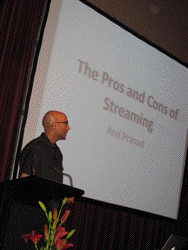April 2012
Anil Prasad and the "Economic Reality of Streaming for Musicians"
12/04/12 12:29

he modern world of digital music streaming has opened a Pandora's Box of issues and challenges for artists and labels, both indie and mainstream. Famed guitarist Robert Fripp (King Crimson/David Bowie/Brian Eno), and other notable musicians have been litigating against companies like Grooveshark, for using their music without permission and or adequate compensation. Spotify, one of the newest and biggest companies to offer online streaming, has also come under scrutiny for the amount of monies actually paid to their artists.
Anil Prasad, one the most respected music journalists in his field and author of the critically acclaimed book, Innerviews, (a culmination of some of his fantastic interviews with many of the world's best musicians), recently flew to New Zealand to present the keynote address for the "2012 Sounds Aotearoa Music Expo", on the pros and cons of streaming. It was an informative presentation that gave the viewer an impressive overview of where we've been, where we are and where we may be heading in this labyrinth known as digital streaming. Prasad has graciously allowed me to present his latest version, specifically designed for US audiences that will hopefully clarify the conundrum facing musicians today.
Prasad begins by walking viewers down memory lane through the "tangled" history of online music, beginning with Napster in 1999, the first of the peer-to-peer services; the advent of Limewire and KaZaA in 2002, the seemingly indestructible Pirate Bay in 2003 and MegaUpload in 2005, escalating the era of music and video filesharing and piracy to unprecedented heights.
To combat the pirates, services like iTunes, Amazon, emusic and others were born, ushering in a new era of legal streaming. Prasad notes that despite those efforts, music sales continued to decline, much to the chagrin of the RIAA, the Recording Industry of America. Lawsuits soon followed, snaring college students, grandmothers and yes, even dogs. Of the $64 Million spent, only $1.4 Million was ever recouped.
Prasad also cites some compelling data to illustrate the disparity between the payouts by services like iTunes and the newer services like Spotify. At first glance, these services look great. Imagine paying $5 to $ 10 per month for unlimited access to all of your favorite music for your computer, or mobile device. Your entire library in the palm of your hands sounds pretty nifty.
The big issue notes Prasad, comes from the disparity in the payouts to the musicians and songwriters. Prasad looks at Spotify for example, which has about 15 Million users and growing, with a target of 100 Million. In 2011, Spotify took in $266 Million and with groups like Sony, BMG, Warner, Universal and EMI as investors, it's 300 employees will be sitting pretty when they go public.
How much of that revenue is actually going to the artists? "Spotify pays out $0.005 per play to musicians. If you compare that to US minimum wage for example, ($7.25 per hour), one song would have to be played 1,450 times to equal $7.25", notes Prasad. By comparison, a typical indie artist makes $14 on a $15 CD, and $8.40 from $12 album on iTunes. On Spotify, the same album would have to be played 100 times in order for the artist to make $6!
It is this kind of unsustainable math that has artists in an uproar. "How can I survive selling music if it's streaming dirt cheap, 24x7 on any device?" Artists like the Paul McCartney, Adele, Cold Play, Tom Waits, Black Keys, Porcupine Tree, Zoe Keating and even Pink Floyd among others, decry this way of making a living through streaming and are withholding their music from Spotify, much to their chagrin.
Prasad believes there is hope for artists, but they will have to take control of their destiny, citing alternative monetization methods like Bandcamp, Top Spin, CD Baby, Cash Music, and even Kickstarter, allowing the artist to keep a much larger percentage of their revenues as well as promoting through great social networking.
I believe Prasad is correct in his assessments, as it will likely take as he puts it, "An artist and fan revolt, the lack of new music, and fading back catalog interest", to change the paradigm. Piracy may never die, but it is imperative for these new services to "fairly compensate artists". If not, artists and the fans alike will be giving in to what some have called the new, legal piracy. "The future, is in the artists hands", says Prasad."If you can make the streaming work for you great, but do it intelligently."